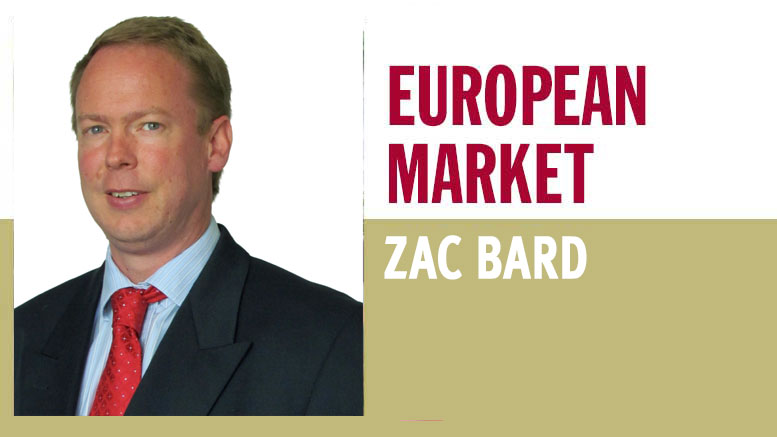Embracing the Green Wave: Avocado Consumption in Europe on the Rise
May 29, 2024 | 4 min to read
Despite economic challenges, the avocado industry in Europe thrived last year, with consumption increasing notably. The U.K. and Germany each consumed approximately 121,000 tons, while France led at 165,000 tons, highlighting a rising appreciation for avocados, especially among Millennials and Generation Z. The sustainability of avocado production is emphasized, with reduced water usage and a lower carbon footprint due to sea freight transport. The World Avocado Organization continues to promote avocado's health benefits and debunk environmental myths, fostering market growth.

Originally printed in the April 2024 issue of Produce Business.
While last year posed challenges for the fresh food industry amidst economic uncertainty and the cost-of-living crisis, the avocado industry continued to show positive growth across Europe.
Last year saw a notable increase in avocado consumption across Europe, with the U.K. securing its position as the joint second-largest consumer alongside Germany, each consuming around 121,000 tons. However, France, leads the pack with 165,000 tons, signifying the growing interest in avocados among European consumers.
The data reveals intriguing nuances, with emerging markets like Scandinavia and Italy joining in at 66,000 and 49,000 tons, respectively.
However, looking further into the consumption trends, France continues to lead with an average of 5 pounds of avocados consumed per person per year. France is followed by the U.K. with 3.5 pounds per person, and Germany in third position with 2.9 pounds.
Commissioned consumer research at the World Avocado Organization (WAO) also indicates a generational shift in avocado consumption, with Millennials and Generation Z emerging as core consumers.
Their affinity for avocados stems from a dual appreciation — the health benefits and unique taste they bring to a variety of dishes. Avocados, with their rich content of healthy monounsaturated fats, vitamins, minerals and fiber, have become a staple in the diets of these generations.
Peru remains the largest supplier of avocados to the European market, contributing 365,710 tons during the 2022-2023 season. Mexico remains the largest supplier to the U.S., with less than 5% of Mexican exports reaching Europe.
This diversity in the avocado supply chain, with contributions from Colombia, Chile, Kenya and South Africa, highlights the complexity and resilience of the market.
SUSTAINABLE PRODUCTION
In line with the trade’s growing emphasis on sustainability, the transportation of avocados plays a pivotal role, with a low carbon footprint. Most avocados reaching European and U.K. markets are transported by sea freight from Latin American and African countries, making them more sustainable than other fruits such as bananas, that are transported by air or land vehicles.
Transportation by sea significantly reduces greenhouse gas emissions compared to local production and transportation by trucks and air freight. As businesses in the trade sector increasingly prioritize environmentally conscious practices, recognizing the lower carbon footprint of avocados in comparison to other food products becomes crucial.
The avocado is also a perennial tree crop. Annual crops such as soy or maize must be replanted each year, while avocado trees can continue to commercially produce for upward of 40 years, increasing carbon capture and reducing soil and water erosion, with mature avocado trees absorbing carbon dioxide at a rate of 44 pounds per year.
Last year saw a notable increase in avocado consumption across Europe, with the United Kingdom securing its position as the joint second-largest consumer alongside Germany.
Another noteworthy facet of sustainability in avocado production is water conservation. Contrary to common misconceptions, the production of avocados is inherently more sustainable, requiring significantly less water than meat and other animal products, including dairy. Furthermore, our growers actively embrace innovative water-saving technologies, such as smart drip irrigation systems equipped with sensors, soil moisture monitoring systems, rainwater harvesting and fertigation, aiming to further reduce water consumption.
Some growers have achieved remarkable success, reducing their water usage by up to 50%. This commitment resonates with our overarching vision of establishing a unique sustainability framework for the industry, dispelling misconceptions about the environmental impact of avocado production and promoting positive sustainability practices.
RETAIL PARTNERSHIPS AND CONSUMER EDUCATION
The WAO plays a pivotal role in meeting grower and consumer demand in Europe. Our collaborative efforts with retailers are geared toward promoting the nutritional value and recognized health benefits of avocados.
In 2023, we reached an important milestone with 30 retail partnerships with retailers across Europe. We’ve also been expanding our marketing efforts, getting our recipes and information into media outlets in France, Germany, Spain, the U.K. and as of this year, Italy.
Additionally, we have expanded our marketing initiatives to India, a growing market for avocados and trade. The production of avocados boosts employment, improves poverty rates and contributes significantly to the global economic growth of many nations.
It becomes evident that the continuous rise in avocado consumption across Europe means avocados are becoming a staple in consumers’ diets. However, there is still more to do to bust the common myths that most believe about avocados and the environmental footprint, and that is what we will continue to do to help inform consumers on the facts and continue debunking the myths, fostering growth in the European avocado market through knowledge, as well as efficient and sustainable actionable practices.

Zac Bard is the chairman of the World Avocado Organization, a nonprofit organization founded in 2016, whose members are avocado growers, exporters and importers from around the world — including the top four grower suppliers. For the complete study or any other queries, contact: info@ worldavocadoorganisation.com.
4 of 15 article in Produce Business May 2024

